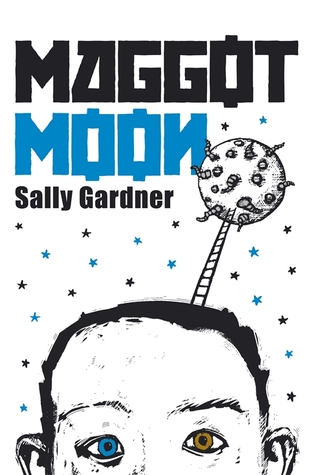Sally Gardner’s Maggot
Moon might be my favorite book of 2012, alongside Libba Bray’s The Diviners and Daniel Handler’s Why We Broke Up. I also came across a
copy by surprise at this year’s NCTE conference in Las Vegas, where Candlewick
Press had a few ARCs on hand. I have seen the book is out in Chapters in
Canada, where it’s striking and chilling cover art on display. Gardner
previously wrote I, Coriander, a
novel that earned both popular and critical success when it was published in
2005. In addition to her writing, Garnder is perhaps best known for her work
with raising awareness about dyslexia, which she herself has. Her protagonist
in Maggot Moon, Standish Treadwell,
is also dyslexic, and his mind works differently from those “train-track
thinkers” that fill up the rest of the book. Gardner details the way he
processes information, emphasizing the fact that he can deftly pick out words
that are spoken, focusing on sound because he has more difficultly with reading
the way words are spelled. When Standish looks at the blackboard at his school,
for example, he says, “I mean, I sat at the very back of the class – the
blackboard could have been in another country. The words were just circus
horses dancing up and down. At least, they never stayed still long enough for
me to work out what they were saying.”
Standish lives in an alternate reality set in the 1950s,
where he lives in the undesirable Zone 7 with his Gramps, which is under strict
control of the Motherland. Gardner utilizes a back and forth narrative that
doesn’t stick to linear time; instead, she jumps back and forth to cover
different periods of Standish’s life in Zone 7. These include the time he lived
with his parents, when he moved in with his Gramps, when Hector and his
parents, Mr. and Mrs. Lush moved in, and when Standish and his Gramps were on
their own again. All of this leads up to a startling conclusion to the story
that is detailed step-by-step, as Standish attempts to put in motion a story about
a hero who defeats a giant that he remembers from childhood.
Gardner creates a bleak and grey world that is equal parts The Book Thief, A Clockwork Orange, and 1984.
A reading of Maggot Moon alongside
any of these novels would emphasize the dystopian, historical, alternative, and
grim realities of each. In Zone 7, school is an institution that breeds a
certain kind of conformity and fear, and Standish will substitute the word
“sheep” for his classmates as they go along with authority figures throughout
the novel. The terrifying Mr. Gunnell stands out in this novel, a character who
is so appalling that he leaps through the pages at times to arrest the reader
in place as he/she encounters an event. Standish describes an incident with his
teacher at the beginning of the novel, a description and occasion that set a
precedent for his later appearances:
Frick-fracking hell! I should
have seen that coming. Mr. Gunnell’s cane made my eyes smart, hit me so hard on
the back of my hand that it left a calling card. Two thin, red weals. Mr.
Gunnell wasn’t tall but his muscles were made out of old army tanks with
well-oiled army-tank arms. He wore a toupee that had a life of its own,
battling to stay stuck on the top of his sweaty, shiny head.
Standish’s relationships with the people around him are the
most affecting in this novel. His Gramps, for example, took him in when his
parents were disappeared, or were killed, something Standish likens to falling
down a hole. Standish says of him, “…Gramps was the only person that still
pulled at the gravity in me.” When Hector’s family moves into Zone 7, Standish
and his Gramps go over with a bowl of raspberries stolen from a field behind
the wall, and while they are there, Standish’s Gramps takes a gun and starts
shooting the rats in the house as a part of a nuanced “welcome to the
neighborhood”: “Numbers mattered to Gramps. Seven dead rats was something the
king of rats would respect. Shoot one rat and all his relatives will come
looking for you; shoot seven and they understand you mean business.”
This 1950s alternate universe breeds propaganda, and a
mission to the moon is on everybody’s minds, and TVs, as the Motherland
attempts to secure its power globally. Large moments in this novel are rendered
small and everyday in order to emphasize the absurdity of the totality of power
in the Motherland. When Standish walks home from school, his Gramps says,
“They said there had been some
trouble at school.”
“Yes. Mr. Gunnell killed Little
Eric Owen, and I’ve been expelled.”
He put his hand on my shoulder and
squeezed it. That squeeze said everything. It said, thank God you are all right.
There are too many layers, levels, and threads running
through this novel to talk about here, and most of the enjoyment comes from
unraveling them from beginning to end. Standish’s imagination, creativity, and
way of viewing the world make this narrative work, and his ability to still
believe in change in this stagnant society. Because, as Standish says,
What would happen if we sat here
dead still, did nothing? Would time leave us alone, pass us by?
Bring down the curtain.
Bring up the credits.
The end.





1 comment:
I really loved this book. At the start I had so much hope that there would be some sort of happy ending for Standish and Hector but as I read more and more of the book I began to realise how horrible it would be for them whatever happened because as Standish says "like all the rear of us who lived in Zone Seven, they were never going anywhere " and even if they could go to the land of Croca colas (Ammerica) they would end up disapointedhttps://www.google.co.uk/url?sa=t&source=web&cd=1&ved=0CC8QFjAA&url=http%3A%2F%2Fwww.markertek.co.uk%2FCatalog%2FIn-Ear-Monitoring%2FSENN-CX300-11-B&ei=F_TMUNqTHYzI0AW3zID4CQ&usg=AFQjCNGuhvI_7WYaIfCBEeRlGgco0FN9DQ
Post a Comment